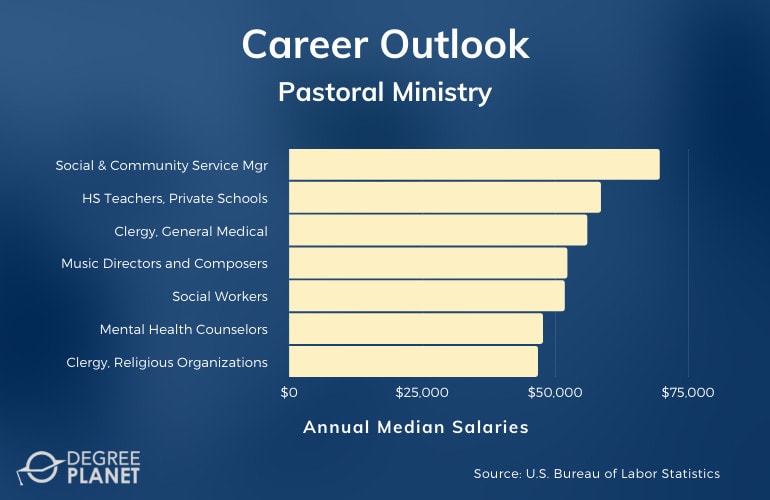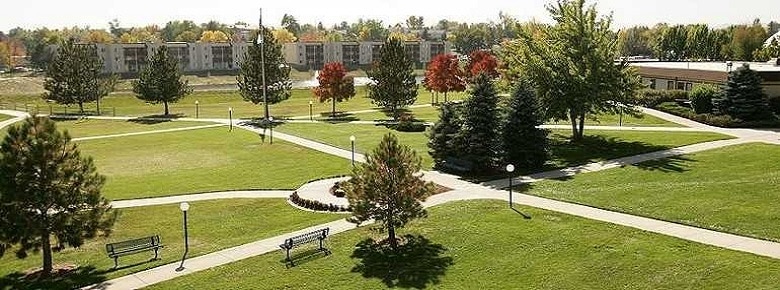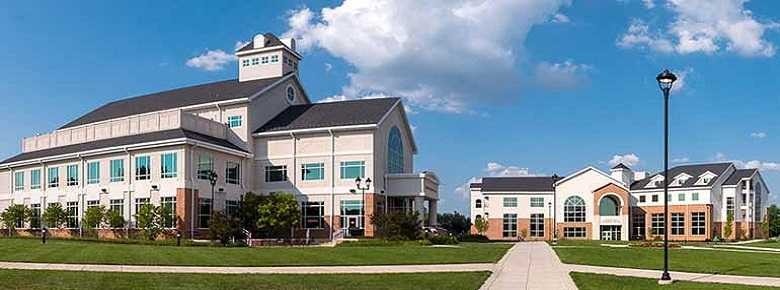If you want to get a college degree that helps you prepare for leadership responsibilities in a local church or religious organization, then you might pursue an online pastoral ministry degree.

Editorial Listing ShortCode:
This kind of pastoral schooling can enable you to explore your Christian faith, study the Bible, and learn practical skills and methods that can help equip you for ministry and open doors to new careers.
Online Pastoral Ministry Degrees
Pastoral ministry degrees online develop students’ understanding of the Bible and its revelatory teachings in the context of biblical culture and history. Some universities offer bachelors, masters, and even DMin degree online programs.
Editorial Listing ShortCode:
These programs can also integrate training in a range of practical pastoral skills related to counseling, worship arts, and youth ministry, for example. Depending on the areas of concentration you’re interested in, you may:
- Deepen your understanding of the Bible
- Learn how to craft compelling sermons
- Become more adept at helping others with spiritual formation
- Learn practical church leadership skills
Pastoral ministry degrees can also provide an intensive and well-rounded biblical foundation for pursuing ordination, if you decide to pursue that path. Pastor schooling can also be a way for you to deepen your own Christian formation before embarking on any number of secular career pathways.
If you are interested specifically in youth ministry, it may be worth looking into the youth ministry degree online or on-campus programs that a growing number of universities offer.
Common Bachelor’s Degree in Pastoral Ministry Concentrations

Getting a pastoral degree isn’t limited to learning about preaching and church administration. Many programs often academic concentrations that can help you cultivate your individual vocational aptitudes and spiritual gifts. Here are a few common pastoral ministry concentrations:
- Church Leadership. This concentration emphasizes leadership skills and methods for crafting and delivering sermons. It also covers Bible exposition and practical administrative skills for staffing, budgeting, and church programming.
- Caring Ministries and Counseling. In this concentration, you can learn counseling methods. You can also explore how to foster biblical sources of wisdom and resilience that enable you to come alongside congregants and help them navigate intense personal struggles and trials.
- Children, Youth, and Families Ministries. This concentration combines biblical principles of discipleship with concepts and principles from the fields of education and psychology. You may gain spiritual, doctrinal, theoretical, and practical insights for being an effective family ministries coordinator or leader.
- Worship and the Arts. This concentration provides opportunities to explore connections between art, music, poetry, dance, literature, and scripture. It also encompasses practical training in liturgical concepts and worship programming and design.
- Faith-Based Social Work. If your Christian calling is more mission focused and outward reaching, this concentration could be a good fit. This concentration teaches biblically grounded organizational development, administration, and leadership skills. It also explores practical fundraising and advocacy skills that can help advance faith-based relief or community service efforts.
Thinking about your own career goals can help you determine the type of pastoral degree programs and concentrations that best align with your individual passions, spiritual gifts, and career interests.
Pastoral Ministry Careers & Salaries

Career pastors can enjoy a lifetime of work that is spiritually fulfilling, service oriented, and also intellectually engaging.
Careers in ministry can include roles related to religious education, religious programs, and church leadership. These positions typically involve preaching or teaching, caring ministries, and administrative duties, among many other functions. According to the Bureau of Labor Statistics, the following careers are related to the field of ministry.
| Careers | Annual Median Salaries |
| Social and Community Service Managers | $69,600 |
| High School Teachers, Private Schools | $58,550 |
| Clergy, General Medical and Surgical Hospitals | $55,990 |
| Music Directors and Composers | $52,250 |
| Social Workers | $51,760 |
| Substance Abuse, Behavioral Disorder, and Mental Health Counselors | $47,660 |
| Clergy, Religious Organizations | $46,720 |
| Religious Activities and Education Directors | $45,110 |
| Social and Human Service Assistants | $35,960 |
| Religious Workers | $33,530 |
Pastoral counseling and pastoral leadership skills can be a foundation for many careers, though some career paths listed here do require additional schooling and licensing. Your chosen degree concentration can also impact your qualifications in the workforce.
Editorial Listing ShortCode:
Graduates might work as educators and administrators at church schools, bible schools, or private schools. Those who have a desire to counsel others may pursue certification to work as marital or behavioral counselors. Ministry professionals may also pursue serving or leadership positions at community service organizations.
For students who are more interested in pastoral counseling, a number of colleges and universities offer both in-person as well as online pastoral counseling degree programs.
B.S. in Pastoral Ministries Curriculum & Courses

Courses will vary by school and program, but here are examples of some courses you may come across in a pastoral ministry program:
- An Introduction to Christian Traditions: This course is a broad exploration of the Christian worldview, core strands of biblical narrative, and cultural and ethical traditions associated with Old Testament and New Testament doctrine.
- Church History: This course is a survey of church history in early, medieval, and modern church periods, including topics related to the early church, political persecutions, church schisms, and the Protestant Reformation.
- Old Testament Studies: You’ll learn about pivotal events in the Old Testament, studying the context of historical and cultural factors and theological doctrine.
- New Testament Theology: This class focuses on key features of New Testament scripture and theology and key areas of contrast between Old Testament law and New Testament theology.
- Caring Ministries: This course incorporates biblical teaching and principles as well as secular methods and concepts related to therapeutic counseling, preparing aspiring pastors for roles in counseling and caring ministries.
- Pastoral Leadership: You’ll learn about effective methods for church administration, including staffing and staff supervision, finances and budgeting, and homiletics.
- Evangelism and Pluralism: This class explores the dynamics of working with different kinds of faith populations—across social and racial profiles, generational differences, denominational contexts, and geographical influences.
- Cults, Heresies, and Controversies: This course examines how scholars seek to define and navigate conflicting interpretations and expressions of church doctrine. This includes an exploration of high-profile heresies, contemporary doctrinal controversies, and the dividing lines between congregations and cults.
- Worship Arts: You’ll discover how you can apply knowledge of liturgical traditions, scripture, contemporary culture, and your own unique and artistic creativity to designing traditional, blended, or contemporary worship services.
- Christian Education and Outreach: You’ll get an overview of the institutional structures, ministries, and methods fostering effective Christian outreach, communication, formation, and education.
Pastoral schooling usually combines training in Christian theology, biblical studies, and practical skills and methods related to many facets of pastoral service. This can include training for effective caring ministries, for developing youth and adult Christian programming, for effective preaching and outreach, and for managing administrative tasks.
How to Become a Pastor

Many churches and church leaders are eager to support, guide, and encourage those who want to become pastors, but different denominations can have their own guidelines or requirements for this position. Here are some common steps on the path to becoming a pastor:
- Bachelor’s degree. Prospective pastors typically need to spend a fair amount of time learning about scripture and biblical precepts in addition to learning practical ministry methods. Getting a bachelor’s degree can help you build a solid foundation for further study.
- Internships, volunteering, and on-the-job training. On your journey to becoming a pastor, you can seek volunteer or internship opportunities with a church staff or ministry organization. Some people gain on-the-job training by helping with youth ministry programming, helping with church administration, or helping develop or lead worship services.
- Master of Divinity (MDiv). For many denominations, the road to being a pastor includes deepening your understanding of biblical languages, church doctrine, church history, and biblical exegesis through graduate studies. It’s common for aspiring pastors to earn an MDiv.
- Ordination. One of the last steps to becoming a pastor is receiving ordination. You are typically ordained by your denomination or local church, and requirements or expectations for ordination may vary.
Some people are ordained as pastors without going to graduate school or while completing their graduate studies. Depending on the denomination, church, or individual situation, there can be exceptions to the conventional path to ordination.
Bachelor in Pastoral Ministry Admissions Requirements

Admissions requirements vary by university and program, but here are some common requirements you may encounter as you compare pastoral ministry degrees online:
- SAT or ACT scores (only some schools require them). Satisfactory SAT or ACT scores can help you demonstrate your academic readiness. Standardized test scores may also help you overcome other obstacles to admissions, such as lackluster grades on your high school transcript.
- High school diploma. Admissions officers will ask for a copy of your high school diploma and transcripts or for a diploma equivalent—such as an overseas diploma or a GED certificate.
- Satisfactory GPA. Not all programs require a minimum GPA, but many do. The minimum specified can vary, often ranging between 2.5 and 3.5.
- Letters of recommendation. It’s common to be asked to submit letters of recommendation. Unless it’s already specified who needs to write the letters, you might ask past teachers, pastors, or coaches. It’s strategic to ask someone who knows you well and can speak to your gifts, work ethic, and sense of vocational purpose, passion, or direction.
If you have questions about admissions or unusual circumstances, you can reach out to a prospective school’s admissions office for guidance and more information.
Online Pastoral Degrees Accreditation

When you’re trying to find the right program for your goals and interests, it’s strategic to only consider fully accredited schools and programs.
Regional accreditation typically offers the best assurances and can help you be more confident that you’re getting quality academic programming and support services. Accreditation can sometimes be required for professional licensing or for some forms of financial aid. In addition, credible graduate programs will generally only recognize and honor bachelor degrees that were earned at an accredited institution.
Editorial Listing ShortCode:
The Council for Higher Education Accreditation (CHEA) offers information about accreditation and how to find regionally accredited schools.
Pastoral Ministry Licensure and Certifications
The steps required to become an active minister are often determined by the denomination in which you want to serve. Licensing requirements can also vary by state.
For most denominations, some form of graduate study is often a qualifier for ordination. This can vary, though, depending on the specific church and situation. Some pastors also want to work toward becoming licensed relationship counselors, mental health counselors, or teachers. These roles typically have unique licensing requirements that will be governed by individual state licensing boards.
Financial Aid and Scholarships

If you’re wondering how to cover the tuition costs of your pastoral ministry program, you may want to compare tuition costs as you research schools and programs.
That said, financial aid opportunities can also give qualifying students a way to move forward and stay focused on their learning goals. Common forms of aid include state and federal grants, scholarships, and student loans. Many students rely on financial aid, but it can be beneficial to plan your financial decision-making carefully. Since terms of financial aid packages can vary, it’s strategic to review any and all offers carefully.
If you plan to apply for need-based aid, you can start by filling out the Free Application for Federal Student Aid (FAFSA).
Pastoral Ministry Professional Organizations

Being part of a professional organization like those listed below can be a strategic way to boost your learning and grow your network of like-minded Christian leaders.
- Association of Professional Chaplains (APC)
- Christian Camp and Conference Association (CCCA)
- National Association of Evangelicals (NAE)
Whether it’s keeping up with news and trends in your field, finding out about new learning opportunities, or expanding your networks, association memberships can offer many benefits.
What Is a Pastor?

A pastor is someone who is ordained or licensed to carry out congregational leadership. Some pastors lead their own churches, and others lead large pastoral staffs.
Some work as associate pastors, leading a specific ministry or age group within the church. For example, associate pastors may work as youth leaders, mental health and relational counselors, outreach or missions coordinators, or worship leaders, depending on their training and spiritual giftings.
Pastors may also work in the military, at hospitals, or at other care facilities. Being a pastor often requires impartiality, compassion, emotional resilience, and spiritual and doctrinal insight.
What Does a Pastor Do?
Many pastors responsible for leading a church may be more inclined to ask, “What don’t pastors do?” A lead pastor will often be responsible for preparing weekly sermons, officiating at marriages and funerals, helping lead the church staff and various church committees, and more.
Editorial Listing ShortCode:
Churches with larger congregations and larger operating budgets may be able to share pastoral duties across a team of pastors. Other common responsibilities for pastors include offering spiritual counseling and care to congregants, developing and leading programming for Christian education, and hosting fellowship events. An associate pastor may also be in charge of a specific ministry or demographic within the church.
What Is Church Planting?

Evangelism, spreading the good news of Jesus Christ, is a core biblical value. Some pastors engage with this biblical mission by church planting. This involves starting a new church, building up a new church community, preaching scripture, and helping cultivate passionate Christian disciples.
Many pastors try to plant a church in an area that’s lacking sound biblical teaching. Church planters may be supported by a home church, but many start out with a very small budget and not a lot of administrative support. The Book of Acts in the New Testament describes the evangelism of Jesus’ apostles.
In Acts, the apostle Paul and other believers travel through the middle east and Asia Minor spreading the good news of the gospel, helping start new church communities, and encouraging congregants.
What Can You Do with a Degree in Pastoral Ministry?

Many professionals with a pastoral ministry degree work for churches. They can help with administrative roles, with youth or college ministry programs, or with leading worship services.
If you feel called to pursue pastoral ordination, a bachelors in pastoral ministry can act as a solid foundation for graduate studies in divinity. Of course, not everyone who studies theology and pastoral leadership goes on to get ordained or pursue careers in the church.
Common careers related to ministry include marriage and family therapist, social worker, school counselor, high school teacher, school administrator, or social and community services manager. A number of these careers require additional specialized training and licensure.
How Long Does It Take to Get a Pastoral Ministry Degree Online?

When enrolled full-time, it typically takes 4 years to complete a traditional bachelor’s degree program in pastoral ministry. Programs that offer 8 week terms and continuous year-round enrollment may enable you to finish in less time.
There are also pastoral ministry degrees online, as well as online theology degree programs, with options for more flexible, part-time learning formats. Part-time studies can help you balance other life commitments, but it may also take you longer to earn your bachelors.
Do You Need a License to Preach?
Becoming a licensed minister authorizes you to perform official pastoral duties, such as preaching and officiating at legally binding weddings.

In many denominations, becoming a licensed pastor requires biblical training and the satisfaction of state licensing requirements. Many pastors become licensed when they become ordained through their local church. In some circumstances, such as if a person does not satisfy a church’s ordination requirements, a church may license someone to preach and hold off on the ordination process until a later date.
What’s the Difference Between a Licensed Pastor vs. Ordained Pastor?
There are some key differences between licensed and ordained pastors.
| Pastoral Licensing | Pastoral Ordination |
|
|
Many pastors are both ordained and state licensed. Others, depending on their particular role, may be only ordained or licensed.
What Are the Requirements to Be a Pastor?

The requirements for becoming a pastor really can vary based on the type of privileges or duties you want to perform and the goals you have for serving in a particular denomination. Most people who pursue pastoral roles follow a path to ordination under the guidance of the church leaders in their own church or faith denomination.
Ordination requirements will vary, but it’s common for them to include the following:
- Master of Divinity (MDiv) or related graduate degree
- Ministry experience
- Completion of church’s or denomination’s theological exam
In some cases and denominational settings, people may acquire the biblical knowledge and ministry skills they need to be commissioned as a pastor with less formal education or training.
How Much Do Pastors Make?
What pastors make can vary by denomination and by the size and location of the church. Some pastors may earn salaries based on congregational giving or tithes or augmented from other denominational resources. According to the Bureau of Labor Statistics, the median salary for clergy is $51,940 per year, with most clergy making between $28,410 and $89,510. The median for religious activities and education directors is $45,110.
Editorial Listing ShortCode:
Some pastors, especially those at smaller churches, may serve bivocationally. This means that they work another full-time or part-time job in addition to their pastoral duties. Some choose to work in complementary fields, such as counseling or education. Marriage and family therapists earn a median annual salary of $51,340, and the median salary for high school teachers at private schools is $58,550 (Bureau of Labor Statistics).
What’s the Difference Between a Pastor vs. Minister?
While the titles “pastor” and “minister” are sometimes used interchangeably in many contexts, these terms can also have more specific connotations.
| Pastor | Minister |
|
|
While a pastor is a type of minister, a minister is not necessarily a pastor.
What’s the Difference Between a Pastor vs. Priest?

Many people often use the terms “pastor” and “priest” interchangeably, but the two roles are distinct.
- Pastor: A pastor is an ordained church office charged with leading a Christian congregation.
- Priest: A priest is usually an ordained clergy charged with leading congregations in Catholic or Greek Orthodox settings.
In Protestant contexts, you’ll typically want to think in terms of ministers and pastors and reserve the word priest for Catholic settings. The Christian church and Catholic church can also have different requirements and expectations for their religious leaders.
Is an Online Pastoral Ministry Degree Worth It?

Yes, an online pastoral ministry degree is worth it for many students. Many churches and religious organizations need passionate people with the kind of practical training and Christian education you can develop in a pastoral ministry degree program.
With an online pastoral ministry degree, you might be equipped to help church leaders in administrative support roles, to guide youth groups, or to help shape or lead worship programming. Christian ministry degrees online or on campus can also impart soft skills that are applicable in various fields. Many religious studies professionals pursue pathways related to counseling, education, social work, or nonprofit leadership.
Editorial Listing ShortCode:
The Bureau of Labor Statistics projects 12% job growth for community and social service occupations and 10% job growth for education, training, and library occupations.
Universities Offering Online Bachelors in Pastoral Ministry Degree Programs
Methodology: The following school list is in alphabetical order. To be included, a college or university must be regionally accredited and offer degree programs online or in a hybrid format.

Biola University offers an online program for a Bachelor of Science in Biblical Ministries. Each course is 7 weeks long. To graduate, students must complete 120 credit hours. Students may also transfer in up to 70 qualifying credits from previous academic or volunteer work. Applicants must submit an online application with official transcripts, SAT or ACT test scores, and an admission essay.
Biola University is accredited by the WASC Senior College and University Commission.

Campbellsville University offers a Bachelor of Science in Pastoral Ministries. To graduate, students must complete 120 credit hours. Each class in the program can be completed online and is 8 weeks long. Applicants must submit an online application with copies of their high school transcripts.
Campbellsville University is accredited by the Southern Association of Colleges and Schools Commission on Colleges.

Colorado Christian University offers a Bachelor of Art in Christian Ministry. The program allows students to complete online classes one at time, with each class lasting for 5 weeks. To graduate, students must obtain 120 credit hours. Applicants must have a high school GPA of 2.8 or higher and submit a spiritual recommendation and an application essay.
Colorado Christian University is accredited by the Higher Learning Commission.

Grand Canyon University offers a Bachelor of Arts in Christian Studies with an emphasis in Global Ministry. Students must complete 120 credit hours to graduate. Classes can be taken online and are 7 weeks long. Applicants must submit an admissions form with copies of their official high school transcripts.
Grand Canyon University is accredited by the Higher Learning Commission.

Indiana Wesleyan University offers an online Bachelor’s in Christian Ministry Leadership program. Students must obtain 120 credit hours to graduate, but those who have already begun a similar program may be able to take the completion program, which only requires 48 credit hours. To be eligible for the program, applicants must have a high school diploma or GED certificate.
Indiana Wesleyan University is accredited by The Higher Learning Commission.

Johnson University offers online programs for a Bachelor of Ministry Leadership, a Bachelor of Pastoral Care and Counseling, and a Bachelor’s in Strategic Ministry. Each program requires students to complete 120 credit hours and offers a number of different concentrations. Applicants can apply online with references and ACT or SAT test scores.
Johnson University is accredited by the Southern Association of Colleges and Schools Commission on Colleges.

Lancaster Bible College offers a Bachelor of Arts in Ministry Leadership. All classes can be completed online. Each class is 6 weeks long and completed one at a time. To graduate, students must complete 120 credit hours. Applicants must have a GPA of 2.0 or higher and submit official high school transcripts.
Lancaster Bible College is accredited by the Middle States Commission on Higher Education.

Lee University offers an online Bachelor’s in Ministry Leadership program. It is designed for mature students. Students may add an emphasis in Business, Church Administration, Children’s Ministry, Counseling, Discipleship, Music and Worship, Pastoral Ministry, or Youth Ministry. Applicants must have three years of experience beyond high school to be eligible for the program.
Lee University is accredited by the Southern Association of Colleges and Schools Commission on Colleges.

Liberty University offers a Bachelor of Science in Religion with an emphasis in Christian Ministries. The program offers online courses that are 8 weeks long. To graduate, students must complete 120 credit hours. Applicants must have a GPA of 2.0 or higher to be eligible for the program.
Liberty University is accredited by the Southern Association of Colleges and Schools Commission on Colleges.

Lincoln Christian University offers a Bachelor of Arts in Christian Ministry. To graduate, students must complete 120 credit hours, including 23 electives. Those interested in the program must submit an online application, an essay, a Christian character reference, and official high school transcripts.
Lincoln Christian University is accredited by the Higher Learning Commission.

Mid-America Nazarene University offers a Bachelor of Science in Christian Ministries. The program is offered online and designed to work as a stepping stone for those interested in obtaining a master’s degree in the field. Those interested in the degree may apply online through the school’s website.
MidAmerica Nazarene University is accredited by the Higher Learning Commission.

Mount Vernon Nazarene University offers an online Bachelor of Arts in Christian Ministry program. It is offered online, and each class is 6 weeks long. To graduate, students must complete 120 credit hours. Applicants are accepted at the beginning of every month. An online application with official transcripts must be submitted.
Mount Vernon Nazarene University is accredited by the Higher Learning Commission.

Nazarene Bible College offers an online Bachelor of Arts in Pastoral Ministries program. Students must complete 128 credit hours with a GPA of 2.0 or higher to graduate. Those interested in the program must apply online with copies of the official high school transcripts.
Nazarene Bible College is accredited by The Higher Learning Commission.

Ohio Christian University offers a Bachelor of Arts in Leadership and Ministry. All classes can be completed online and are 5 weeks long. Students may add a concentration in Biblical Studies, Church Planting, Intercultural Ministries, Organizational Leadership, or Pastoral Ministry. Applicants must have a GPA of 2.0 or higher and submit official transcripts.
Ohio Christian University is accredited by The Higher Learning Commission.

Oral Roberts University offers a Bachelor of Arts in Ministry and Leadership with an emphasis in Local Church Pastor. Each class can be completed online and is 7 weeks long. To graduate, students must obtain 124 credit hours. Applicants must submit an online application with copies of their official transcripts and SAT or ACT test scores.
Oral Roberts University is accredited by the Higher Learning Commission.

Regent University offers a Bachelor of Arts in Christian Ministry. The program can be completed online and requires students to obtain 120 credit hours with a minimum GPA of 2.0 to graduate. To be eligible for the program, applicants must complete an admissions questionnaire and submit copies of their transcripts and government-issued ID.
Regent University is accredited by the Southern Association of Colleges and Schools Commission on Colleges.

Southeastern University offers a Bachelor of Science in Ministry Leadership. Students must complete 122 credit hours to graduate. They may choose one of the following tracks: Biblical Studies, Christian Ministry, or Pastoral Care and Counseling. Applicants must submit high school transcripts, SAT or ACT test scores, a Christian character reference, and an admissions essay.
Southeastern University is accredited by the Southern Association of Colleges and Schools Commission on Colleges.

Southwestern Adventist University offers both a Bachelor of Arts in Religion and a Bachelor of Arts in Theology. Both programs require students to complete 121 credit hours to graduate. Those interested in studying at the school must have a minimum GPA of 2.75 or higher and ACT or SAT test scores.
Southwestern Adventist University is accredited by the Southern Association of Colleges and Schools Commission on Colleges.

The University of Northwestern—St. Paul offers both a Bachelor of Arts and a Bachelor of Science in Pastoral Ministry. Both programs are designed as dual degree programs, allowing students to obtain a Master of Divinity at the same time. Those interested in the program must apply online with copies of their official transcripts.
The University of Northwestern – St. Paul is accredited by the Higher Learning Commission.

Warner University offers an online Bachelor of Science in Christian Ministry program for adult-learners. Courses are 8 weeks long and are taken two at a time. To be eligible for the program, applicants must have a minimum GPA of 2.25, an ACT score of 18, or an SAT score of 940.
Warner is accredited by the Commission on Colleges of the Southern Association of Colleges and Schools.
Getting Your Pastoral Ministry Degree Online

A pastoral ministry degree can enable you to dig deeper into biblical studies while learning about the day-to-day cultural and practical challenges that religious leaders contend with.
Many accredited institutions also offer credible pastoral ministry degrees online. Online programming generally offers more convenience and flexibility, helping you balance your studies with life or work responsibilities. There are many program options out there, so you can look for the curriculum design and concentration that best fits your individual learning goals and interests.
A growing number of universities are also offering online masters in ministry degree programs for busy working professionals wanting to further their educations.
If you’re ready to pursue your spiritual passions and learn foundational ministry and leadership skills, you can start exploring online pastoral ministry degrees today!

